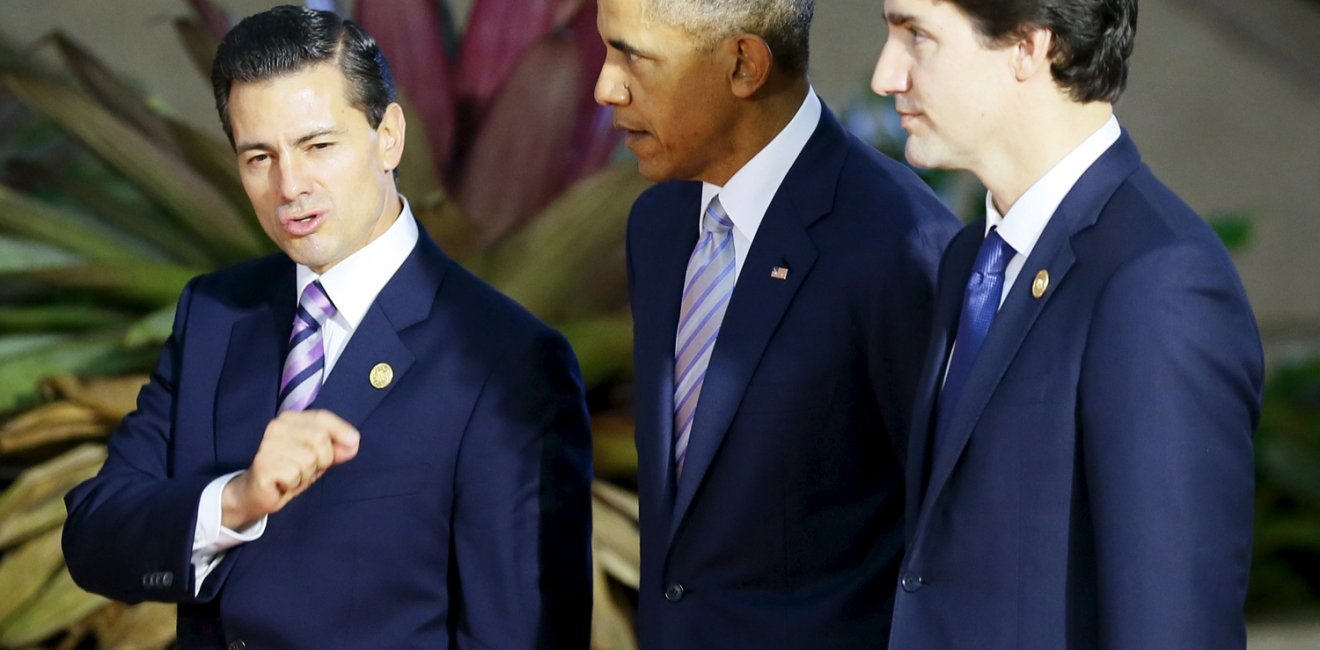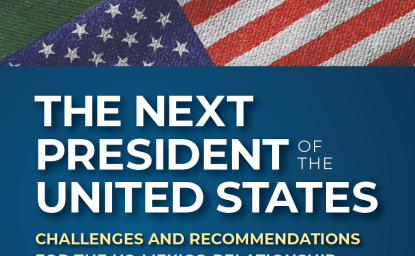Relations among North America’s three big neighbors are much more important to their citizens’ self-interest than the great majority of those citizens realize. The U.S. media’s focus on Mexico is too often negative, while Canada frequently gets neglected. The political campaign season in the United States has magnified negative statements about North American ties by candidates building on stereotypes and false premises. How can we push back and get our publics to see and support the enormous benefits of cooperation across North America?
The June 29 North American Leaders Summit (NALS) in Ottawa provides a valuable opportunity for Prime Minister Justin Trudeau and Presidents Barack Obama and Enrique Pena Nieto to make the case. They have the opportunity to present a clear vision about the North American partnership at a time in when it is sorely needed, and to offer initiatives that help show the tremendous value of that collaboration for our economies, our security, and our environment. What takes place at this summit and during the follow-up has the potential and power to significantly augment the economic well-being and security of North America. Successfully challenging the distorted and erroneous public rhetoric that reigns is not just the work of the three governments, however. They need the active support of those who benefit from North America’s partnership.
While the media and candidates have no trouble raising the challenges facing North America, from drugs to unauthorized migration, to workers left behind, the benefits of cooperation rarely become sound bites, and they don’t fit on campaign bumper stickers. Yet our economies have benefited enormously from North American partnership. Canada and Mexico are the two largest buyers of U.S. exports, and studies link some 14 million U.S. jobs spread across most U.S. states to these sales. The United States is also the largest market for Mexico and Canada. North America’s production chains have proven vital to the ability of the United States as well as Canada and Mexico to compete with China and others in the global economy, as we build and innovate together. As part of their daily business, well over 1 million people legally cross the borders between the three countries, while tens of millions of tourists give additional boosts to local economies. We rely on each other to help deepen security against direct attack from terrorists and other non-traditional threats.
While the media and candidates have no trouble raising the challenges facing North America, from drugs to unauthorized migration, to workers left behind, the benefits of cooperation rarely become sound bites, and they don’t fit on campaign bumper stickers.
Together, the three countries of North America constitute a major world energy and biodiversity power. Better coordination as we develop these resources will help secure energy for our economies, add stability and sustainability to world energy markets, and preserve our shared environment.
There are issues of enormous significance and potential. When the continent’s leaders meet in Ottawa, they have a chance to emphasize the value, counter the critics, and approve real steps to benefit their publics. Making the case that increased connectivity is good for all three economies in the face of serious global competition will be vital given the public criticism, but the arguments need to take into account that a notable chunk of the U.S. electorate feels left behind by international trade and job dislocations. The leaders can publicize facts about commerce and jobs in North America to refute the criticisms being leveled, but the vision presented must also acknowledge the need and will to find solutions for those left behind.
The three leaders will no doubt highlight the need to make our borders more efficient and safe. We expect them to reiterate their commitment to establishing a North America-wide trusted traveler system, whereby vetted travelers would get expedited treatment at ports of entry. A clear, new objective to reduce wait times at borders would gain support from border communities and many businesses. This is a big issue for the millions living near the borders, and for businesses that trades $3.4 billion each day between countries. Current delays cost billions and generate pollution at jammed border crossings.
North American cooperation cannot just stand on commerce when unstable regions bring the threat of terrorism closer to our shores. The NALS should make clear that mutual security throughout North America is a shared priority. Steps to strengthen border security against terrorists probing North America’s perimeters via expanded information and intelligence sharing would help address public concerns. Reinforced trilateral efforts to tighten cooperation to combat the large flows of illicit drugs, the related unregulated flows of billions of dollars, the illegal trafficking of firearms, or human smuggling across our borders would also send strong positive signals to the public. Given the interlocking networks that connect North America, and recent cyber breaches reported in the news, the leaders could also launch a concerted effort to assure that governments coordinate to protect key infrastructure and respond to cyber-attacks and cyber-crime.
North American cooperation cannot just stand on commerce when unstable regions bring the threat of terrorism closer to our shores.
Efforts in energy security and preserving North America’s environment will also help our citizens see the value of cooperation. The three energy ministers are hard at work on an agenda that can pave the way for long-term energy security for the three economies. In March, Trudeau and Obama set out a very ambitious environmental agenda, one that dovetails with previous work between the United States and Mexico. The three countries can add efforts to preserve and protect the continent’s wildlife. The 2014 commitment to protect Monarch butterflies was the most popular initiative from that NALS. This time, the leaders could build support among concerned publics by adding species such as migratory birds to trilateral conservation work, or consider more collaboration against invasive species, which do not respect borders.
While unlikely to have much traction with the public, Canada, Mexico, and the United States can do more to coordinate in international bodies such as the United Nations and the G-20. The three countries could consider an international initiative that would symbolically underscore their willingness to cooperate -- perhaps that could be in an area such as UN peacekeeping, or a large cultural, economic or sports event.
Obama, Trudeau, and Pena Nieto have an excellent opportunity to seize the moment by offering an inspiring vision of North American cooperation, as well as initiatives to take that partnership forward. Key will be how well the three governments continue the hard work of producing results for the citizens of all three countries and of spreading the word to the public. Given the criticisms, falsehoods, and slurs sadly evident in the U.S. presidential election, it will be vital that governments be joined by the vast numbers of stakeholders, from workers to business owners to civil society groups, who already benefit from the ties across our continent, in explaining why North America should collaborate more. We cannot afford to get sucked up in demagoguery and nativism. We have a rare opportunity to bolster North American partnership, growth and security for decades to come.
The opinions expressed here are solely those of the authors.
This article was originally published on Real Clear World.









